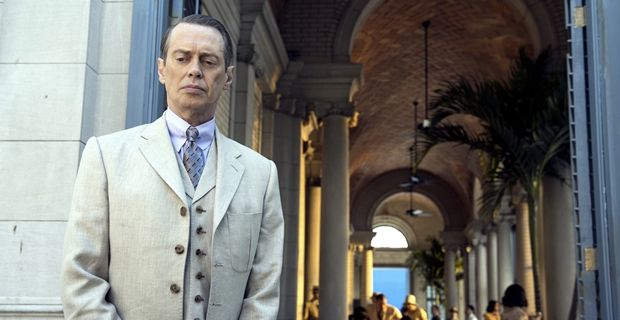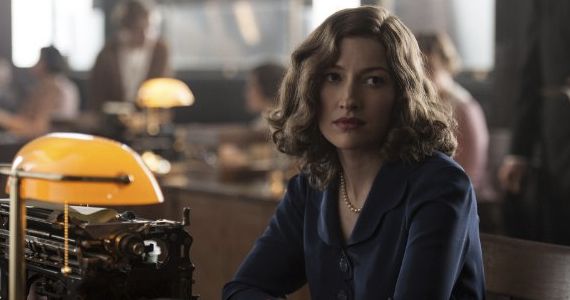[This is a review of Boardwalk Empire season 5, episode 1. There will be SPOILERS.]
-
Season 4 of Boardwalk Empire proved a great many things about Terence Winter's lavish look at prohibition-era crime and gangsters. It showed that a frequently entertaining and beautiful show could at last find its most significant story by going beyond surface of early 20th century American crime and the often visceral, bloody violence that accompanied it. The season dared to pull a loose thread that had always been dangling from its otherwise immaculate suit and watched as something striking and eloquent was revealed, something that was already woven into the finely tailored material.
Season 4, more so than the three seasons of East Coast bootlegging tomfoolery that had come before it, sprang from a foundation of character, as opposed to that of the interesting but less precise principle of examining the specific aspects of criminality during a notorious era. The season will likely be regarded as the series' best, as it reflected so vividly on the lives of the ensemble (notably Chalky White and newcomer Dr. Valentin Narcisse) and how those lives were shaped by the world they lived in, especially when it came to still remarkably relevant societal concerns like race and class.
What's interesting about the season 5 premiere is: Despite tremendous evidence that Boardwalk Empire is at its best when focusing on the ensemble, the series seems intent to focus its final story arc primarily on a single character, rather than around him.
As such, 'Golden Days for Boys and Girls' doubles down its interest in Nucky Thompson, through the introduction of a recurring flashback that concerns a young Nucky and his soon-to-be mentor, the Commodore, circa 1884. And while the flashback suggests that HBO may have an unwritten policy regarding the levels of wistfulness contained in its series' final seasons (e.g., the awful, sepia toned, momentum-killing glimpses into Bill Compton's past throughout True Blood's final 10 episodes), the detour into Nucky's childhood, detailing his nascent relationship with the Commodore, aims to strengthen the series' decision to jump forward in time to 1931 as it juxtaposes two of Nucky's attempts at reinventing himself.
Early on, it's hard to say whether or not this method works. With each flashback, there is a lingering suspicion much of what's onscreen could have been handled just as well through dialogue alone, leaving more time to explore Nucky's efforts to land Bacardi and his relationship with Patricia Arquette's Sally Wheet. That is, the flashbacks offer some insight into what made Nucky the Nucky we know, but little of it feels compelling enough to justify its heavy use in the premiere.
The one thing the flashbacks do well, however, is balance the feeling that, due to the time jump, the season exists in a weird pocket, someplace far away from the stories it had been working for three seasons to tell. In that sense, because the storyline is more or less removed from seasons 1-4, it might as well go all-in on that distanced feeling.
And although the time jump makes sense in terms of what will best serve this final storyline – bringing the Twenty-first Amendment into the spotlight, as well as the death of Joe Masseria and the subsequent rise of Lucky Luciano and Meyer Lansky – it's not without some notable drawbacks.
Boardwalk Empire doesn't get to partake in the St. Valentine's Day Massacre, which would have been a showcase for the show's visual elegance, but it may have also offered some kind of disturbing reflection on the rise of organized crime. More importantly, however, the series suddenly finds itself without the presence of Michael Stuhlbarg's milk-swilling, cake-eating Arnold Rothstein, who winds up being an off-screen casualty since Rothstein died in 1928.
To the credit of Winter and his crew, they have managed to keep Rothstein's story going, by focusing on the aftermath of the stock market crash and underlining Rothstein's professional arrangement with Nucky's estranged wife, Margaret. The scene early on in which one of the brokers working in Margaret's office diverts everyone's attention by commending the perseverance of a castaway Mickey Mouse before taking his own life is an apt example of the historical icing Boardwalk Empire likes to put on the period-drama cake.
And that point of view works, as the series is mostly an on-the-inside-looking-out kind of show anyway. The season's introduction to Margaret also succeeds in encapsulating the terror and desperation felt by money men following the crash without resorting to showing the audience the same images of out-of-work men and women living in slums or begging for work.
All the various threads seem ready to tie into one another fairly quickly – and with only eight episodes to the season, that's a good sign. The only real outlier, then, is Chalky White's arc.
Last season, Boardwalk Empire did itself a huge favor by entrusting Michael Kenneth Williams to lead much of the season 4 storyline. Williams proved himself to be more than capable of handling the additional weight placed on his character's shoulders with a striking performance that ostensibly made him and fellow scene-stealer Jeffrey Wright the stars of the show.
Now that he is on the run from the law after breaking free from a chain gang, the questions of where Chalky is headed and what led to his incarceration suggest the character is once again being given the opportunity to be the main act in his own arc, one that is, for the time being anyway, far from Nucky Thompson and Atlantic City. And as the character himself is something of an outlier in the grand scheme of things, that distance affords the show and Williams a chance to explore Chalky White as a man who has undergone considerable change since the loss of his daughter and his apparent exile at the end of last season.
Through it all, 'Golden Days for Boys and Girls' feels very much like the beginning of the end. There's a desire on behalf of Winter, the other writers, and the directors – especially Tim Van Patten and Alan Coulter, who directed the first two episodes of the season – to make each moment laden with the seriousness that can only come from a looming finale.
That might otherwise feel somewhat oppressive, but after the expressive and resonant success of last season, viewers have a reason to believe that the conclusion to Boardwalk Empire will succeed in reaching beyond the purely visceral into something that packs real emotion as well.
Boardwalk Empire continues next Sunday with 'The Good Listener' @9pm on HBO.
Photos: Macall B. Polay/HBO




